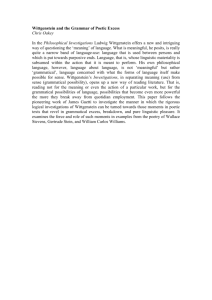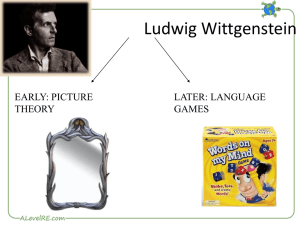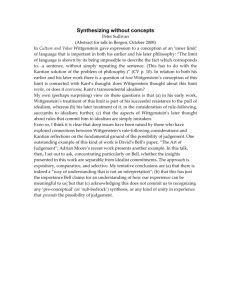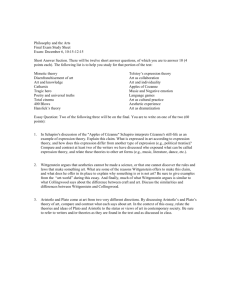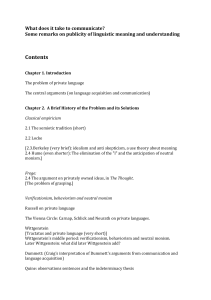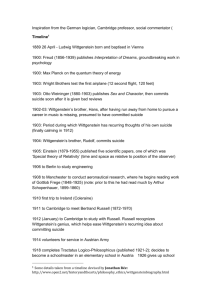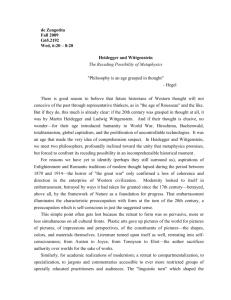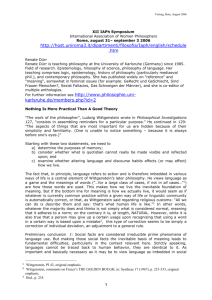Outline Wittgenstein`s private language argument, and
advertisement
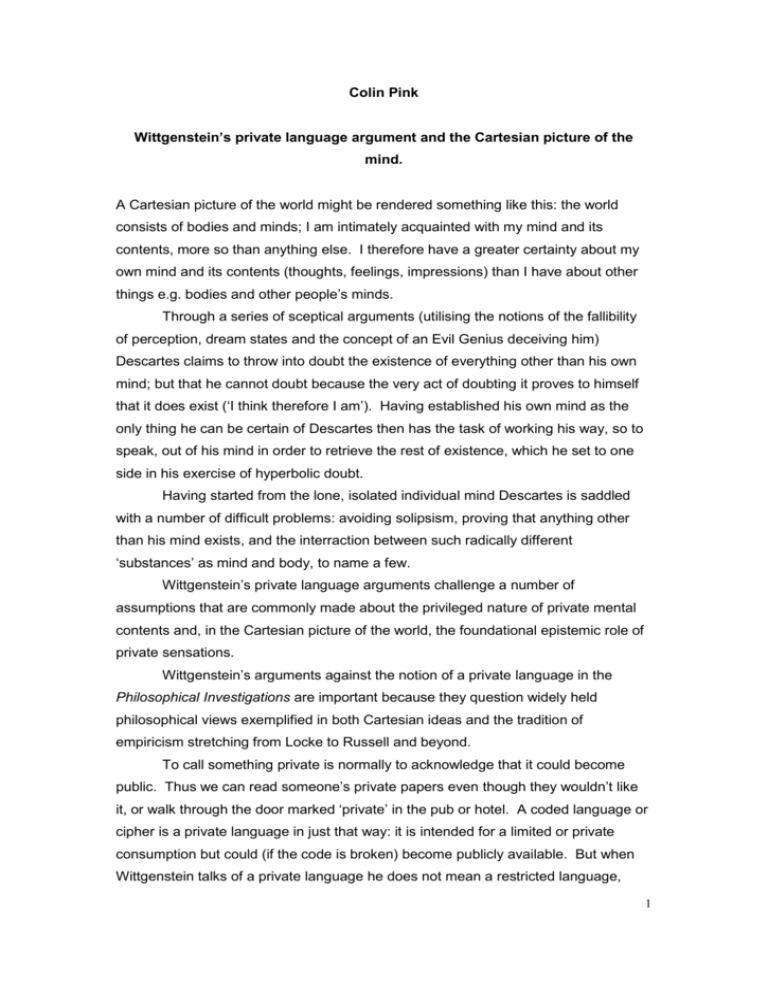
Colin Pink Wittgenstein’s private language argument and the Cartesian picture of the mind. A Cartesian picture of the world might be rendered something like this: the world consists of bodies and minds; I am intimately acquainted with my mind and its contents, more so than anything else. I therefore have a greater certainty about my own mind and its contents (thoughts, feelings, impressions) than I have about other things e.g. bodies and other people’s minds. Through a series of sceptical arguments (utilising the notions of the fallibility of perception, dream states and the concept of an Evil Genius deceiving him) Descartes claims to throw into doubt the existence of everything other than his own mind; but that he cannot doubt because the very act of doubting it proves to himself that it does exist (‘I think therefore I am’). Having established his own mind as the only thing he can be certain of Descartes then has the task of working his way, so to speak, out of his mind in order to retrieve the rest of existence, which he set to one side in his exercise of hyperbolic doubt. Having started from the lone, isolated individual mind Descartes is saddled with a number of difficult problems: avoiding solipsism, proving that anything other than his mind exists, and the interraction between such radically different ‘substances’ as mind and body, to name a few. Wittgenstein’s private language arguments challenge a number of assumptions that are commonly made about the privileged nature of private mental contents and, in the Cartesian picture of the world, the foundational epistemic role of private sensations. Wittgenstein’s arguments against the notion of a private language in the Philosophical Investigations are important because they question widely held philosophical views exemplified in both Cartesian ideas and the tradition of empiricism stretching from Locke to Russell and beyond. To call something private is normally to acknowledge that it could become public. Thus we can read someone’s private papers even though they wouldn’t like it, or walk through the door marked ‘private’ in the pub or hotel. A coded language or cipher is a private language in just that way: it is intended for a limited or private consumption but could (if the code is broken) become publicly available. But when Wittgenstein talks of a private language he does not mean a restricted language, 1 such as a secret code, he has in mind a logically private language, a language that can only be understood by one person. He envisages a language for private sensations that are only available to the person experiencing them. The individual words of this language are to refer to what can only be known to the person speaking; to his immediate private sensations. So another person cannot understand the language.’ PI s243) Such a language would not be able to be made public because no one, apart from the owner of those sensations, would know to what it referred. But is such a notion of a private language coherent? Traditionally philosophers have held that our personal experience forms the foundation of our ability to talk about the world and ourselves. For instance it is held that it is because of my personal experience of pain that I am able to use the word ‘pain’ in an appropriate way and I can only understand other people’s experience of pain through analogy with my own experience. This leads to a conception of language in which it primarily consists in naming things through some form of ostensive definition arrived at through introspection. In contrast to this position Wittgenstein, in the Philosophical Investigations, argues that it is because of my participation in a shared language that I am able to describe my experiences and those of others. If experience were not shared we would not be able to articulate anything meaningful about the personal experiences we do have. According to Wittgenstein to declare ‘I am in pain’ is to give expression to my pain, not to describe it. I am not giving information but asking for help. I do not own my pain in the way that I can own a coat even though the possessive form of words might mislead us into thinking that way. It is senseless to say ‘I know I am in pain’ because it is not possible to be in pain and not know it; if I didn’t feel it I would not be in pain. There is therefore an important asymmetry between first person and third person accounts of sensations and psychological states. There can be no room for doubt in the first person present tense expression of my sensations so to prefix such statements with the phrase ‘I know’ is redundant and expressions of my feelings are not descriptions of my state but expressions of it. On the other hand a third person account can be in error and therefore it does make sense to say ‘I know he is in pain’ because it is always a possibility that I could be wrong. 2 Wittgenstein challenges the priority and the foundational nature of personal experience in the formation and use of language. One important aspect of Wittgenstein’s private language argument is the fact that it draws our attention to the public or shared nature of language. Language is essentially a means of communication between a community of language users for specific purposes (it is this that the examples of particular ‘language-games’ are designed to bring out). It is therefore essentially social and practical in nature. In an important sense we can only imagine a private language because we partake of a public language. In order for language to function as a means of communication it has to be rule governed; the meanings of words cannot change on a whim but must be accepted and understood by the community. To use language is, therefore, to participate in a rule governed activity. In any rule governed activity mistakes can happen when someone misapplies or does not understand a rule. Others, who are competent in the language, can correct their usage if mistakes are made. This is possible because language is shared, a public tool of communication. In the case of a private language it would not be possible to know if the user ever made an error since there is no community of use to compare the linguistic performance against it. As Wittgenstein says: …to think one is obeying a rule is not to obey a rule. Hence it is not possible to obey a rule ‘privately’: otherwise thinking one was obeying a rule would be the same thing as obeying it. (PI s202) Without external validation there is no guarantee that thinking you have followed a rule correctly means that you have in fact succeeded in following it. Wittgenstein exposes the weakness of the notion that sensation language is based on some form of private ostensive definition with the ‘beetle in the box’ example: Now someone tells me that he knows what pain is only from his own case! - Suppose everyone had a box with something in it: we call it a “beetle”. No one can look into anyone else’s box, and everyone says he knows what a beetle is only by looking at his beetle. – Here it would be quite possible for everyone to have something different in his box. One might even imagine such a thing constantly changing. – But suppose the word “beetle” had a use in these people’s language? – If so it would not be used as the name of a thing. The thing in the box has no place in the language-game at all; not even as a something: for the box might even be empty. – No, one can “divide through” by the thing in the box; it cancels out, whatever it is. (PI s293.) 3 Thus agreement on the use of the word ‘beetle’ cannot depend on some private experience but rather on shared use. Wittgenstein provides an alternative account of the basis of our use of words at PI s244: … how is the connexion between the name and the thing named set up? This question is the same as: how does a human being learn the meaning of the names of sensations? – of the word “pain” for example. Here is one possibility: words are connected with the primitive, the natural, expressions of the sensation and used in their place. A child has hurt himself and he cries; and then adults talk to him and teach him exclamations and, later, sentences. They teach the child new pain- behaviour. ‘”So you are saying that the word “pain” really means crying?” – On the contrary: the verbal expression of pain replaces crying and does not describe it.’ Language use is an extension of human behaviour and the use of words is founded upon our forms of life; thus the Inuit have many finely graduated ways of referring to different types of snow whereas European languages have a more limited vocabulary for this phenomenon because these distinctions have greater utility for the Inuit form of life. This is why later in the Investigations Wittgenstein says: ‘If a lion could talk, we could not understand him.’ (p223); he is speculating that the form of life of a lion would be so radically different from ours that there would be no common basis for understanding. Wittgenstein’s private language argument is a part of a broader challenge to commonly held beliefs re: the distinction between the inner and the outer. However, Wittgenstein is not a behaviourist in that he does not seek to deny that mental processes have a part to play. He is only making the point that their role is not that commonly attributed to them by philosophers. For instance, in his account of the notion of remembering he says: ”But you surely cannot deny that, for example, in remembering, an inner process takes place.” . . . The impression that we wanted to deny something arises from our setting our faces against the picture of the “inner process”. What we deny is that the picture of the inner process gives us the correct idea of the use of the word “to remember”. We say that this picture with its ramifications stands in the way of our seeing the use of the word as it is.’ (PI s305) Through the exploration of our actual use in ordinary language Wittgenstein aims to expose the confusions inherent in philosophical ideas about inner mental processes. 4 In what sense are my sensations private? – Well, only I can know whether I am really in pain; another person can only surmise it. – In one way this is wrong, and in another nonsense. (PI s246). It is wrong because we commonly do know when another person is in pain; in fact it is quite a major achievement to be able to hide the fact that one is in pain from others. It is nonsense because ‘it makes sense to say about other people that they doubt whether I am in pain; but not to say it about myself.’ (PI s246). The use of the phrase ‘I know’ is only applicable in circumstances in which it makes sense that I might not know, but having a pain precludes me from not knowing that I have it. Another position that Wittgenstein opposes is the idea that it is impossible for two people to have the same pain. Wittgenstein points out that we do frequently say that we have the same pain. If you and I both complain of a throbbing pain over our left temple we are naturally inclined to say we have the same headache. A scientifically minded critic would be inclined to point out that we do not have the same pain in that the same nerve endings are not being stimulated. But this is not the use of ‘same’ here. It is helpful here to think in terms of the type/token distinction. Where we say we have the same pain we mean the same type even though the token is different. Thus if you and I write the word ‘cat’ we have written the same word but the tokens are different. In the same way it makes sense to say we can have the same pains. Wittgenstein’s arguments in the Philosophical Investigations remove the foundations of the Cartesian notion of the mind. He has shown that a logically private language makes no sense but such a language would need to exist for Descartes' Cogito to work. In addition Wittgenstein shows that our ability to talk about sensations is not based on some private experiential data (a fundamental idea running through empiricist philosophy) but on shared use and forms of life. Wittgenstein’s arguments are also a powerful defence against solipsism since to use language is to bring with it a community of users; the other is therefore not something apart from the individual mind but already embedded in the use of language. If a private language is a logical impossibility then the moment I formulate a solipsistic argument I defeat myself. I think therefore I am; I use language therefore I am not alone. 5 Bibliography: A.J. Ayer, ‘Can There Be a Private Language?’ in George Pitcher (ed) Wittgenstein (London 1966) John Cook, ‘Wittgenstein on Privacy in George Pitcher (ed) Wittgenstein (London 1966) Rene Descartes, The Essential Descartes Margaret Wilson (ed) (New York, 1969) Alan Donagan, ‘Wittgenstein on Sensation’ in George Pitcher (ed) Wittgenstein (London 1966) P.M.S. Hacker, Wittgenstein on Human Nature (London 1997) Anthony Kenny, ‘Cartesian Privacy’ in George Pitcher (ed) Wittgenstein (London 1966) Saul Kripke, Wittgenstein on Rules and Private Language (Oxford 1982) Marie McGinn, Wittgenstein and the Philosophical Investigations (London 1997) Stephen Mulhall, On Being in the World (London 1990) Anthony O’Hear, ‘Wittgenstein and the Transmission of Traditions’ in A. Phillips Griffiths (ed) Wittgenstein Centenary Essays (Cambridge 1991). Rush Rhees, ‘Can There Be a Private Language?’ in George Pitcher (ed) Wittgenstein (London 1966) Jenny Teichman, ‘Wittgenstein on Persons and Human Beings’, in Godfrey Vesey (ed) Understanding Wittgenstein (London 1974) Ludwig Wittgenstein Philosophical Investigations (Oxford 1958) 6
